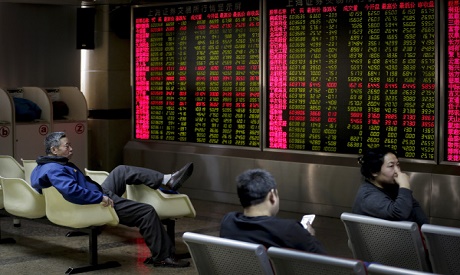
People sit in front of an electronic board displaying stock prices at a brokerage house in Beijing, Thursday, Jan. 14, 2016. (AP)
Emerging assets took another dive on Thursday with stocks plumbing fresh 6-1/2 year lows and currencies slipping as oil dipped below a key threshold and fresh investor concerns over global growth.
MSCI's emerging stock index tumbled 1.3 percent to its lowest since July 2009, with bourses around the globe racking up steep losses after Brent oil prices crashed below the key $30 dollar a barrel threshold - the lowest in 12 years - before struggling higher again. Meanwhile copper prices slipped to a fresh 6-1/2 year low.
"A lot of the weakness we will see in emerging markets will be driven by lower oil and commodity prices," said Per Hammarlund, chief emerging markets strategist at SEB.
"The worries about China aren't over yet - there might be a respite, or a calmer period now the Chinese authorities are intervening," he said, adding that any return of risk appetite was likely to be short-lived.
Asian stocks closed lower with Indonesian shares falling 0.5 percent after a gun and bomb attack rocked Jakarta, killing at least six people.
Stocks in South Africa and Turkey lost around 1 percent, while bourses across eastern Europe chalked up hefty losses, with stocks in Bucharest down 2 percent and Prague and Warsaw falling 1.5 percent.
China mainland shares proved the exception to the rule, closing around 2 percent higher. .
The yuan weakened against the dollar despite the central bank setting its daily guidance rate for the currency firmer in further efforts to stabilise it.
Currencies elsewhere fared little better. Despite assurances from South Africa's Finance Minister Pravin Gordhan that the country was not heading for a recession, the rand weakened 0.5 percent though was still a little way off the record low hit on Monday.
Turkey's lira and Israel's shekel slipped 0.2 percent.
Russia's rouble strengthened 0.2 percent against the greenback, recovering only partially from the steep losses at the start of the week, while yields for the benchmark 10-year bond rose to a three-month high.
Meanwhile the oil price rout pushed neighbouring Azerbaijan closer to a full-blown currency crisis, with the central bank banning some foreign exchange sales in an attempt to support its faltering manat currency.
At the end of last year Azerbaijan became the latest ex-Soviet state to float its currency, which has since plunged more than 30 percent against the dollar.
A raft of central banks were due to publish their decisions on interest rates.
Indonesia's central bank trimmed interest rates by 25 basis points to 7.25 percent as expected to support economic growth, while South Korean policy makers held rates at 1.5 percent and signalled no intention to cut any time soon.
Poland's central bank is expected to keep rates unchanged at 1.5 percent when announcing its decision later in the day while Chile is also expected to hold fire.
Short link: